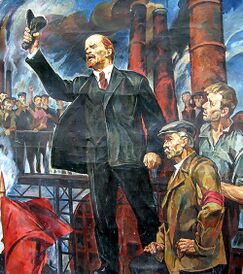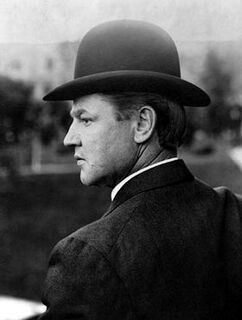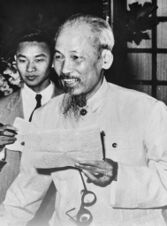Leftism: Difference between revisions
RedParabola (talk | contribs) m (→Markets verses planning: Formatting error) |
RedParabola (talk | contribs) mNo edit summary |
||
| (21 intermediate revisions by 2 users not shown) | |||
| Line 1: | Line 1: | ||
{{Featured article}} | {{Featured article}} | ||
{{alt-lang|Portugese|Esquerdismo}} | |||
{{multiple image | {{multiple image | ||
| align = right | |||
| total_width = 480 | |||
| perrow = 2/2/2 | | perrow = 2/2/2 | ||
| border-width = 2 | | border-width = 2 | ||
| image1 = Robespierre.jpg | | image1 = Robespierre.jpg | ||
| image2 = Lenin gosr painting.jpg | | image2 = Lenin gosr painting.jpg | ||
| image3 = Salvador Allende Gossens.jpg | | image3 = Salvador Allende Gossens.jpg | ||
| image4 = Karl Liebknecht Haus, united front era.jpg | | image4 = Karl Liebknecht Haus, united front era.jpg | ||
| image5 = First Intifada, Gaza strip.jpg | | image5 = First Intifada, Gaza strip.jpg | ||
| image6 = Bill haywood headshot side.jpg | | image6 = Bill haywood headshot side.jpg | ||
| image7 = Ho Chi Minh.jpg | | image7 = Ho Chi Minh.jpg | ||
| image8 = Colonne vendome.jpg | | image8 = Colonne vendome.jpg | ||
| footer = 1. [[Maxmilien Robespierre]] of the [[Jacobins]]. 2. [[V. I. Lenin]], [[Russian Empire|Russia]]n [[Marxist]] [[revolution]]ary. 3. [[Salvador Allende]], [[pacifist]] and [[electoralist]] [[Chile]]an Marxist. 4. Headquarters of the [[Social Democratic Party of Germany]] during the [[United Front]] era, 1932. 5. [[First Intifada]] in the [[Gaza Strip]], an [[anti-imperialist]] struggle headed by leftist and [[socialist]] groups. 6. [[Bill Haywood|"Big Bill" Haywood]], [[United States|American]] socialist organizer. 7. [[Ho Chi Minh]], [[Vietnam]]ese revolutionary. | | footer = 1. [[Maxmilien Robespierre]] of the [[Jacobins]]. 2. [[V. I. Lenin]], [[Russian Empire|Russia]]n [[Marxist]] [[revolution]]ary. 3. [[Salvador Allende]], [[pacifist]] and [[electoralist]] [[Chile]]an Marxist. 4. Headquarters of the [[Social Democratic Party of Germany]] during the [[United Front]] era, 1932. 5. [[First Intifada]] in the [[Gaza Strip]], an [[anti-imperialist]] struggle headed by leftist and [[socialist]] groups. 6. [[Bill Haywood|"Big Bill" Haywood]], [[United States|American]] socialist organizer. 7. [[Ho Chi Minh]], [[Vietnam]]ese revolutionary. | ||
| footer_align = center | | footer_align = center | ||
}} | }} | ||
'''Left-wing politics''', also known as '''leftism''', is a broad grouping of ideological tendencies which seek to alter and advance past the given socio-economic and political status quo in favor of a more egalitarian arrangement. In a modern context, leftist politics centers around the abolition of [[capitalism]] in favor of [[socialism]] and [[Communism (mode of production)|communism]]. Modern leftists also oppose the ideological forces in support of capitalism, including [[liberalism]] and [[fascism]]. | |||
'''Left-wing politics''', also known as '''leftism''', is a broad grouping of ideological tendencies which seek to alter and advance past the given socio-economic and political status quo in favor of a more egalitarian arrangement. In a modern context, leftist politics centers around the abolition of [[capitalism]] in favor of [[socialism]] and [[Communism (mode of production)|communism]]. Modern leftists also oppose the [[Rightism|ideological forces]] in support of capitalism, including [[liberalism]] and [[fascism]]. | |||
Common left-wing tendencies include [[Marxism]], [[anarchism]], [[Reformism|reformist]] or [[democratic socialism]], and the various sub-groupings in those trends. | Common left-wing tendencies include [[Marxism]], [[anarchism]], [[Reformism|reformist]] or [[democratic socialism]], and the various sub-groupings in those trends. | ||
| Line 23: | Line 25: | ||
The terms ''left-wing'' and ''leftism'' are derived from the [[French Revolution]], when the more progressive, egalitarian political factions were seated on the left-side of the assembly whereas the reactionary factions sat on the right-wing.<ref>[[wikt:left-wing|"left-wing"]] ''Wiktionary''</ref> | The terms ''left-wing'' and ''leftism'' are derived from the [[French Revolution]], when the more progressive, egalitarian political factions were seated on the left-side of the assembly whereas the reactionary factions sat on the right-wing.<ref>[[wikt:left-wing|"left-wing"]] ''Wiktionary''</ref> | ||
== Tendencies == | == Tendencies== | ||
===Marxism=== | |||
=== Marxism === | |||
{{Main|Marxism}} | {{Main|Marxism}} | ||
Marxism is the framework of ideas developed by [[Karl Marx]] and [[Friedrich Engels]] in the 19th century. It incorporated [[continental philosophy]], [[Utopian socialism|early socialist thought]], and contemporary [[political economy]] to create [[Dialectical materialism|dialectical]] and [[historical materialism]] as well as [[Marxist economics|Marxian economics]]. Marxism distinguishes itself from other forms of socialist thought in that it regards itself as [[scientific socialism]], being founded on concrete analysis of historical phenomena. | |||
==== Leninism ==== | ====Leninism==== | ||
{{Main|Leninism}} | {{Main|Leninism}} | ||
[[Vladimir Lenin]] developed the theories that would later become known as Leninism during the [[Russian Revolution of 1905|1905]] and [[Russian Revolution of 1917|1917 revolutions]] in [[Russian Empire|Russia]]. The concepts he developed included the use of a [[vanguard party]], [[democratic centralism]], and [[imperialism as the highest stage of capitalism]]. | |||
===== Marxism–Leninism ===== | =====Marxism–Leninism===== | ||
{{Main|Marxism–Leninism}} | {{Main|Marxism–Leninism}} | ||
Marxism–Leninism is a communist tendency developed by [[Joseph Stalin]] as a continuation of Leninist theory. It was the official ideology of the [[Union of Soviet Socialist Republics|Soviet Union]] and other [[Socialist state|socialist states]]. After the success of the [[October Revolution|Russian revolution]] in 1917 and the establishment of the Soviet Union in 1922, many [[Communist party|communist parties]] around the world began to adopt Marxism–Leninism as their political line, and Marxism–Leninism was the main theoretical framework which guided multiple proletarian revolutions across the globe during the 20th century. Marxism–Leninism continues to be followed by a large portion of the international workers' movement to this day. | |||
===== Maoism ===== | =====Maoism===== | ||
{{Main|Marxism–Leninism–Maoism}} | {{Main|Marxism–Leninism–Maoism}} | ||
Marxism–Leninism–Maoism, often called just Maoism, is a communist ideology which synthesizes the theory of [[Mao Zedong Thought]] into a universally applicable revolutionary doctrine. It was developed in part by [[Abimael Guzmán]] in the later part of the 20th century, taking heavy inspiration from [[Mao Zedong|Mao]], and upholds concepts like [[protracted people's war]], the [[mass line]], and others as usable revolutionary theories for most if not all countries. Maoism has multiple sub-tendencies, many of which are local to a particular region, such as [[Gonzalo Thought]] in [[Peru]]. | |||
=== Anarchism === | ===Anarchism=== | ||
{{Main|Anarchism}} | {{Main|Anarchism}} | ||
Anarchism is a [[Libertarian socialism|libertarian socialist]] tendency which views all forms of authority and unjust hierarchy as oppressive institutions which must be abolished, chief among them the [[state]]. Anarchists seek to create a [[Communism (society)|stateless socialist society]] based around communal ownership and [[direct democracy]], although there is a large amount of variation on how this model will be exactly implemented or reached among anarchism's sub-ideologies. | |||
====Communist anarchism==== | |||
{{Main|Anarcho-communism}} | |||
Anarcho-communism is an anarchist sub-ideology which seeks to create a [[Communism (society)|communistic society]] in the immediate aftermath of a [[Proletarian revolution|socialist revolution]], using institutions such as a [[gift economy]]. One of the most popular proponents of anarchist communist was [[Peter Kropotkin]], who formalized many aspects of this tendency in his book ''[[The Conquest of Bread]]''. Anarcho-communism broadly emphasizes [[Commune|communalism]] and localized economic distribution. | |||
====Collectivist anarchism==== | |||
{{Main|Collectivist anarchism}} | |||
Anarcho-collectivism is a tendency inspired by the works of [[Mikhail Bakunin|Michael Bakunin]] and [[James Guillaume]] with additional influence from [[Proudhonian economics]]. It puts emphasis on workers' autonomy and holds that the exchange of goods between communities should be determined based on the cost of labor established by communal banks. Other anarchists have described this variant as a ''limited'' form of anarchist communism.<ref>Jeff Stein (1992). ''[https://theanarchistlibrary.org/library/jeff-stein-the-collectivist-tradition The Collectivist Tradition]''. ''Libertarian Labor Review.'' From [[The Anarchist Library|''the Anarchist Library'']]. </ref> | |||
=== Reformist === | ====Syndicalism==== | ||
{{Main|Anarcho-syndicalism}} | |||
Anarcho-syndicalism is a sub-variety of anarchism involving organizing revolutionary [[Trade union|trade unions]] that will lead a [[general strike]] in order to overthrow capitalism and the state, and will form the basis for a socialist society. | |||
===Reformist=== | |||
{{Main|Reformism}} | {{Main|Reformism}} | ||
Reformist socialism includes multiple tendencies which seek to create a socialist society primarily by the gradual and peaceful ''reformation'' of capitalism. Although [[social democracy]] is sometimes considered to be a reformist socialist ideology, it is usually considered to be the left-ward flank of liberalism, a capitalist ideology.<!-- Add Eurocommunism if you want here, I refrained because they still claim to be Marxists, unlike many democratic socialists and what-not. --> | |||
==== Democratic socialism ==== | ====Democratic socialism==== | ||
{{Main|Democratic socialism}} | {{Main|Democratic socialism}} | ||
Democratic socialism is a blanket term which can refer to a number of leftist ideologies that seek to establish socialism through participation in [[bourgeois democracy]], and stress the importance of democratic rights in the socialist society they want to establish. Democratic socialists often favor markets in addition to decentralized economic planning,<ref>[https://www.dsausa.org/dsa-political-platform-from-2021-convention/#economic-justice "DSA Political Platform: Economic Justice"]. ''Democratic Socialists of America website''</ref><!-- You're free to add a better source, assuming you can navigate past the bourgeois news and academics who think socialism and social-democracy are the same. --> although it is sometimes also misused<!-- Not necessarily without a basis. Many "democratic socialists" are essentially left-liberals who think socialism is the same as capitalist social programs. --> as a synonym with capitalist social democracy. | |||
==Issues== | == Issues and contradictions == | ||
===State verses anarchy=== | ===State verses anarchy=== | ||
{{See also|State socialism}} | {{See also|State socialism}} | ||
A common point of division between leftists is towards the question of a revolutionary state. Most Marxists, particularly [[Marxism–Leninism|Marxist–Leninists]] and [[Marxism–Leninism–Maoism|Maoists]], argue it is necessary to create a [[Dictatorship of the proletariat|revolutionary dictatorship of the proletariat]] following the revolution to maintain the gains of the [[working class]], fight class enemies, etc.<ref name=":1">[https://espressostalinist.com/marxism-leninism-versus-revisionism/anarchism/ "Anarchism"] ''The Espresso Stalinist''</ref> Anarchists and other [[Libertarian socialism|libertarian socialists]] on the other hand believe that creating a state in any form, socialist or not, will lead to the leaders of that state growing as corrupt as the bourgeois government preceding it, which will reproduce capitalist society. Therefore, from an anarchist perspective, [[statelessness]] is the most liberative form of political organization.<ref>[http://bse.sci-lib.com/article055028.html "Anarchism" (In Russian)] ''Great Soviet Encyclopedia'' </ref> | A common point of division between leftists is towards the question of a revolutionary state. Most Marxists, particularly [[Marxism–Leninism|Marxist–Leninists]] and [[Marxism–Leninism–Maoism|Maoists]], argue it is necessary to create a [[Dictatorship of the proletariat|revolutionary dictatorship of the proletariat]] following the revolution to maintain the gains of the [[working class]], fight class enemies, etc.<ref name=":1">[https://espressostalinist.com/marxism-leninism-versus-revisionism/anarchism/ "Anarchism"] ''The Espresso Stalinist''</ref> Anarchists and other [[Libertarian socialism|libertarian socialists]] on the other hand believe that creating a state in any form, socialist or not, will lead to the leaders of that state growing as corrupt as the bourgeois government preceding it, which will reproduce capitalist society. Therefore, from an anarchist perspective, [[statelessness]] is the most liberative form of political organization.<ref>[http://bse.sci-lib.com/article055028.html "Anarchism" (In Russian)] ''Great Soviet Encyclopedia''</ref> | ||
===Revolution verses reformism=== | ===Revolution verses reformism=== | ||
{{Main|Reform versus revolution}}One of the main contentions in left-wing thought is the question of whether socialism is to come by gradual reforms and participation in [[bourgeois democracy]] or by the extra-legal revolutionary overthrow of the capitalist system. Reformist socialists argue that electoralism and participation in bourgeois parliament is adequate in slowly developing socialism, and is preferable over the potentially negative repercussions of a revolution.<ref name=":0">Vladimir Lenin (1913). ''[https://www.marxists.org/archive/lenin/works/1913/sep/12b.htm Marxism and Reformism]'' at the [[Marxists Internet Archive]].</ref> The main supporters of reformism are democratic socialists and [[Eurocommunism|Eurocommunists]]. | {{Main|Reform versus revolution}} | ||
One of the main contentions in left-wing thought is the question of whether socialism is to come by gradual reforms and participation in [[bourgeois democracy]] or by the extra-legal revolutionary overthrow of the capitalist system. Reformist socialists argue that electoralism and participation in bourgeois parliament is adequate in slowly developing socialism, and is preferable over the potentially negative repercussions of a revolution.<ref name=":0">Vladimir Lenin (1913). ''[https://www.marxists.org/archive/lenin/works/1913/sep/12b.htm Marxism and Reformism]'' at the [[Marxists Internet Archive]].</ref> The main supporters of reformism are democratic socialists and [[Eurocommunism|Eurocommunists]]. | |||
Revolutionary socialists, including most anarchists, Marxists, and other tendencies, regard reforms under capitalism as nothing more than temporary concessions by the ruling class, which themselves are often only able to be afforded by the wealth gained from imperialist extraction like in modern social democracies. Although many socialists argue that under certain conditions, tactical participation in parliament is warranted, revolutionists ultimately believe that only after the total overthrow of the violent capitalist system is socialism truly able to be achieved, and that long-term participation in the bourgeois government will result in nothing more than the party degenerating into a capitalist party (e.g. the modern [[Social Democratic Party of Germany]]).<ref name=":0" /> | Revolutionary socialists, including most anarchists, Marxists, and other tendencies, regard reforms under capitalism as nothing more than temporary concessions by the ruling class, which themselves are often only able to be afforded by the wealth gained from imperialist extraction like in modern social democracies. Although many socialists argue that under certain conditions, tactical participation in parliament is warranted, revolutionists ultimately believe that only after the total overthrow of the violent capitalist system is socialism truly able to be achieved, and that long-term participation in the bourgeois government will result in nothing more than the party degenerating into a capitalist party (e.g. the modern [[Social Democratic Party of Germany]]).<ref name=":0" /> | ||
===Vanguardism verses spontaneity=== | ===Vanguardism verses spontaneity === | ||
{{Main|Vanguard party}} | {{Main|Vanguard party}} | ||
Marxists–Leninists, Maoists, and other tendencies hold that a dedicated vanguard party of the most politically advanced sections of the working class is needed to secure revolutionary gains and organize the people for a [[revolutionary situation]]. This vanguard party will eventually form the basis for the dictatorship of the proletariat and socialist state after a socialist revolution. However, certain Marxist trends like [[council communism]] as well as most anarchists believe that a dedicated vanguard of revolutionaries will do little more than form a new bureaucratic caste, and therefore argue that the revolution must be directed by the [[spontaneity]] of the masses and other decentralized action.<ref name=":1" /> | Marxists–Leninists, Maoists, and other tendencies hold that a dedicated vanguard party of the most politically advanced sections of the working class is needed to secure revolutionary gains and organize the people for a [[revolutionary situation]]. This vanguard party will eventually form the basis for the dictatorship of the proletariat and socialist state after a socialist revolution. However, certain Marxist trends like [[council communism]] as well as most anarchists believe that a dedicated vanguard of revolutionaries will do little more than form a new bureaucratic caste, and therefore argue that the revolution must be directed by the [[spontaneity]] of the masses and other decentralized action.<ref name=":1" /> | ||
| Line 69: | Line 90: | ||
*[[Internal debates]] | *[[Internal debates]] | ||
*[[United front]] | *[[United front]] | ||
*[[Praxis]] | |||
==References== | ==References== | ||
<references /> | <references /> | ||
[[Category:Leftism]] | [[Category:Leftism]] | ||
Latest revision as of 01:16, 26 April 2024
Left-wing politics, also known as leftism, is a broad grouping of ideological tendencies which seek to alter and advance past the given socio-economic and political status quo in favor of a more egalitarian arrangement. In a modern context, leftist politics centers around the abolition of capitalism in favor of socialism and communism. Modern leftists also oppose the ideological forces in support of capitalism, including liberalism and fascism.
Common left-wing tendencies include Marxism, anarchism, reformist or democratic socialism, and the various sub-groupings in those trends.
Etymology
The terms left-wing and leftism are derived from the French Revolution, when the more progressive, egalitarian political factions were seated on the left-side of the assembly whereas the reactionary factions sat on the right-wing.[1]
Tendencies
Marxism
Marxism is the framework of ideas developed by Karl Marx and Friedrich Engels in the 19th century. It incorporated continental philosophy, early socialist thought, and contemporary political economy to create dialectical and historical materialism as well as Marxian economics. Marxism distinguishes itself from other forms of socialist thought in that it regards itself as scientific socialism, being founded on concrete analysis of historical phenomena.
Leninism
Vladimir Lenin developed the theories that would later become known as Leninism during the 1905 and 1917 revolutions in Russia. The concepts he developed included the use of a vanguard party, democratic centralism, and imperialism as the highest stage of capitalism.
Marxism–Leninism
Marxism–Leninism is a communist tendency developed by Joseph Stalin as a continuation of Leninist theory. It was the official ideology of the Soviet Union and other socialist states. After the success of the Russian revolution in 1917 and the establishment of the Soviet Union in 1922, many communist parties around the world began to adopt Marxism–Leninism as their political line, and Marxism–Leninism was the main theoretical framework which guided multiple proletarian revolutions across the globe during the 20th century. Marxism–Leninism continues to be followed by a large portion of the international workers' movement to this day.
Maoism
Marxism–Leninism–Maoism, often called just Maoism, is a communist ideology which synthesizes the theory of Mao Zedong Thought into a universally applicable revolutionary doctrine. It was developed in part by Abimael Guzmán in the later part of the 20th century, taking heavy inspiration from Mao, and upholds concepts like protracted people's war, the mass line, and others as usable revolutionary theories for most if not all countries. Maoism has multiple sub-tendencies, many of which are local to a particular region, such as Gonzalo Thought in Peru.
Anarchism
Anarchism is a libertarian socialist tendency which views all forms of authority and unjust hierarchy as oppressive institutions which must be abolished, chief among them the state. Anarchists seek to create a stateless socialist society based around communal ownership and direct democracy, although there is a large amount of variation on how this model will be exactly implemented or reached among anarchism's sub-ideologies.
Communist anarchism
Anarcho-communism is an anarchist sub-ideology which seeks to create a communistic society in the immediate aftermath of a socialist revolution, using institutions such as a gift economy. One of the most popular proponents of anarchist communist was Peter Kropotkin, who formalized many aspects of this tendency in his book The Conquest of Bread. Anarcho-communism broadly emphasizes communalism and localized economic distribution.
Collectivist anarchism
Anarcho-collectivism is a tendency inspired by the works of Michael Bakunin and James Guillaume with additional influence from Proudhonian economics. It puts emphasis on workers' autonomy and holds that the exchange of goods between communities should be determined based on the cost of labor established by communal banks. Other anarchists have described this variant as a limited form of anarchist communism.[2]
Syndicalism
Anarcho-syndicalism is a sub-variety of anarchism involving organizing revolutionary trade unions that will lead a general strike in order to overthrow capitalism and the state, and will form the basis for a socialist society.
Reformist
Reformist socialism includes multiple tendencies which seek to create a socialist society primarily by the gradual and peaceful reformation of capitalism. Although social democracy is sometimes considered to be a reformist socialist ideology, it is usually considered to be the left-ward flank of liberalism, a capitalist ideology.
Democratic socialism
Democratic socialism is a blanket term which can refer to a number of leftist ideologies that seek to establish socialism through participation in bourgeois democracy, and stress the importance of democratic rights in the socialist society they want to establish. Democratic socialists often favor markets in addition to decentralized economic planning,[3] although it is sometimes also misused as a synonym with capitalist social democracy.
Issues and contradictions
State verses anarchy
A common point of division between leftists is towards the question of a revolutionary state. Most Marxists, particularly Marxist–Leninists and Maoists, argue it is necessary to create a revolutionary dictatorship of the proletariat following the revolution to maintain the gains of the working class, fight class enemies, etc.[4] Anarchists and other libertarian socialists on the other hand believe that creating a state in any form, socialist or not, will lead to the leaders of that state growing as corrupt as the bourgeois government preceding it, which will reproduce capitalist society. Therefore, from an anarchist perspective, statelessness is the most liberative form of political organization.[5]
Revolution verses reformism
One of the main contentions in left-wing thought is the question of whether socialism is to come by gradual reforms and participation in bourgeois democracy or by the extra-legal revolutionary overthrow of the capitalist system. Reformist socialists argue that electoralism and participation in bourgeois parliament is adequate in slowly developing socialism, and is preferable over the potentially negative repercussions of a revolution.[6] The main supporters of reformism are democratic socialists and Eurocommunists.
Revolutionary socialists, including most anarchists, Marxists, and other tendencies, regard reforms under capitalism as nothing more than temporary concessions by the ruling class, which themselves are often only able to be afforded by the wealth gained from imperialist extraction like in modern social democracies. Although many socialists argue that under certain conditions, tactical participation in parliament is warranted, revolutionists ultimately believe that only after the total overthrow of the violent capitalist system is socialism truly able to be achieved, and that long-term participation in the bourgeois government will result in nothing more than the party degenerating into a capitalist party (e.g. the modern Social Democratic Party of Germany).[6]
Vanguardism verses spontaneity
Marxists–Leninists, Maoists, and other tendencies hold that a dedicated vanguard party of the most politically advanced sections of the working class is needed to secure revolutionary gains and organize the people for a revolutionary situation. This vanguard party will eventually form the basis for the dictatorship of the proletariat and socialist state after a socialist revolution. However, certain Marxist trends like council communism as well as most anarchists believe that a dedicated vanguard of revolutionaries will do little more than form a new bureaucratic caste, and therefore argue that the revolution must be directed by the spontaneity of the masses and other decentralized action.[4]
Markets verses planning
In modern and historical leftist discourse, a question exists over how to organize a socialist economy. Tendencies like democratic socialism, Titoism, market anarchism, and Dengism have argued that markets are needed in order to develop the productive forces and provide a superior mode of distribution over a planned economy, which they perceive as ineffective and bureaucratic. On the contrary, socialist advocates of a planned economy argue that markets fundamentally reproduce capitalist relations, generate the same periods of economic crisis due to their inability to be rationally planned, and ultimately create a new bourgeois class which will eliminate socialism and restore capitalism as a whole once empowered.[7] The exact form of a planned economy also differs among different tendencies; anarchists and other libertarian socialists wanting a decentralized and communal-based form of planning whereas Marxists–Leninists and others wanting centralized economic planning.
See also
References
- ↑ "left-wing" Wiktionary
- ↑ Jeff Stein (1992). The Collectivist Tradition. Libertarian Labor Review. From the Anarchist Library.
- ↑ "DSA Political Platform: Economic Justice". Democratic Socialists of America website
- ↑ 4.0 4.1 "Anarchism" The Espresso Stalinist
- ↑ "Anarchism" (In Russian) Great Soviet Encyclopedia
- ↑ 6.0 6.1 Vladimir Lenin (1913). Marxism and Reformism at the Marxists Internet Archive.
- ↑ "Yugoslav Revisionism" The Espresso Stalinist







